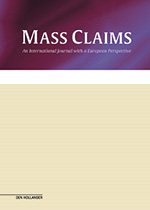Inleiding
Foreword
Environmental, Social and Governance (ESG) considerations evolved from corporate buzzwords into legal, financial and ethical imperatives. Across jurisdictions, we are witnessing a growing wave of litigation and regulation targeting ESG concerns, from climate change and supply chain transparency to data governance. These developments reflect both the shifting public expectations and a fundamental change in how legal systems enforce corporate accountability.
Collective ESG litigation is becoming more common globally and across Europe... ...lees meer
Artikel
Axel Halfmeier and Malte Schlichting1This paper examines the lack of legal standing for associations in environmental cases under German private law. Environmental claims by associations are limited to public law, while association actions in consumer law are often ineffective with regard to environmental violations. This contradicts Article 9(3) of the Aarhus Convention, which mandates public access to environmental justice. The paper advocates for legal reforms to align German law with international obligations. In this context, current developments such as the European Commission's proposal on plastic pellet loss and the... abonneren of dit artikel .
Charlotte de Meeûs1This paper explores if and how Third-Party Litigation Funding ("TPLF") can be used as a means to enhance access to justice in environmental collective litigation in the EU. It assesses whether environmental collective actions are, by their nature, compatible with TPLF. Then, it discusses possible initiatives that could be implemented to encourage third-party litigation funders to expand the scope of their activities to environmental claims that continue to experience a funding gap. 1. Introduction While it is rising across the world,[2] environmental litigati... abonneren of dit artikel .
Rhonson Salim1Collective environmental claims straddle the protection of two interests - the diffused and the individual. Given the duality of interests involved, the representative element in standing criteria take on greater significance in such claims. This article critiques the current approach towards representation in collective environmental claims before selected domestic and international courts. The article draws on perspectives from philosophy and political science to advocate for a novel (re)conceptualisation of representation in these claims. With a new conceptual foundation established... abonneren of dit artikel .
Ilaria Pretelli1Improving Social Sustainability through Cross-Border Public Interests Litigation The scientific community is faced with the urgent task of rethinking and deconstructing the traditional, clichéd roles of public and private actors in socioenvironmental governance. Sociologists have used legal pluralism theory to show that a society's legal order is not exclusively determined by the public authorities of the state that govern it. On the other hand, economists have acknowledged that corporate profit-making does not inherently promote a state's economic welfare. Environmental ... abonneren of dit artikel .
Aukje van Hoek and Etienne Pataut1This article looks at the role of trade unions in enforcing the Due Diligence Directive. Due to the international and extraterritorial character of the due diligence obligations of the company covered by the CS3D, its enforcement also has cross-border elements. The article covers both the role the directive ascribes to the unions and other worker representatives as such and private international law complications relating to standing in cross-border cases, applicable law and jurisdiction. 1. Setting the scene In this article we want to draw attention to the r... abonneren of dit artikel .
Francesca Episcopo, Anna van Duin and Aart Jonkers1Drawing on scholarship in informational capitalism, this paper argues that large-scale GDPR violations by Big Tech—termed 'business model violations'—generate systemic data harms that require collective action as well as remedies capable of capturing their collective dimension. The paper contends that existing EU instruments—particularly Articles 80 and 82 GDPR and the Representative Actions Directive—already enable such responses, though their potential is underrealised. By bridging legal doctrine and socio-technical critique, the paper reframes collective redress as not merely feasible... abonneren of dit artikel .
Rubriek
Nieuw artikeltype - rubriek [16-60472]
England & Wales, France, Germany, Italy, The Netherlands, Scotland, Spain and Portugal England and WalesAnna Dannreuther and Rhea GuptaCase law Christine Riefa Class Representative Limited v Apple Inc and Amazon.com Inc [2025] CAT 5 On 14 January 2025, the Competition Appeal Tribunal ("CAT") handed down a landmark judgment refusing to grant a collective proceedings order on the grounds that the Tribunal was not satisfied that the class representative was suitable. England and Wales ... abonneren of dit artikel .



 RSS
RSS